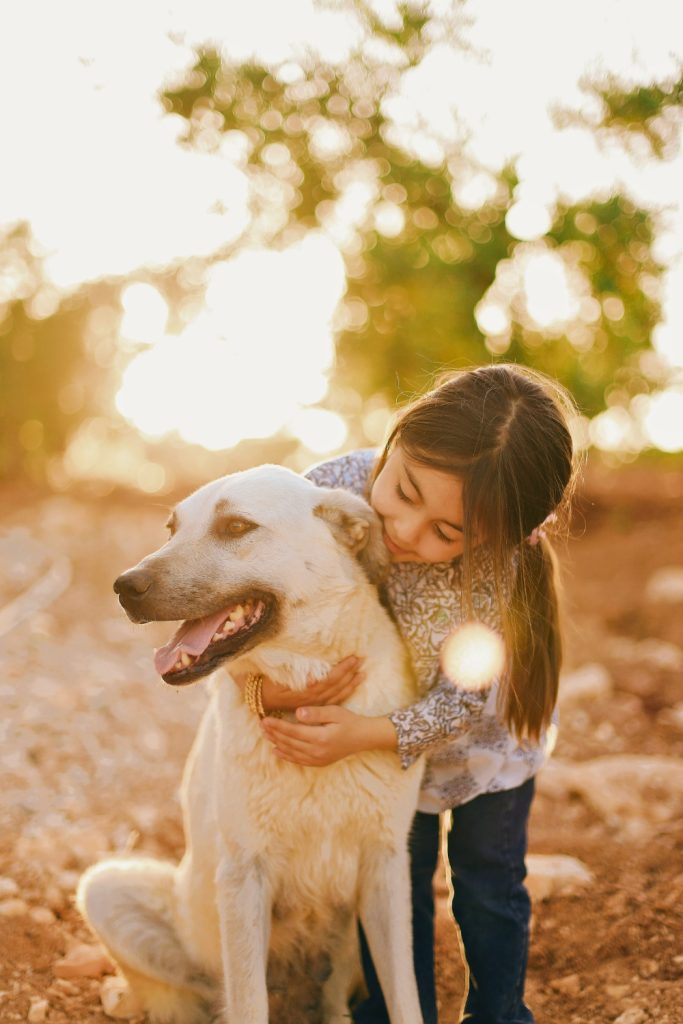Ever wonder why your female dog seems to have a sixth sense for danger? Nope, it’s not just your imagination.
Female dogs have some seriously impressive tricks when it comes to protecting the people they love.
In fact, there are nine surprising behaviors that set them apart from their male counterparts.
Once you discover these, you’ll never see your furry girl the same way again.
1. They’re Natural Guardians
Ever noticed how your dog seems to sense danger before anyone else?
Female dogs have an incredible talent for picking up on threats and reacting fast, making them instinctive protectors of their human families.
If they sense something suspicious, their first move is to position themselves between you and the danger, standing watch like a four-legged bodyguard.
When you’re out on walks or in unfamiliar places, female dogs tend to be more observant than males, who might be a little more impulsive.
Even at home, they’ll choose strategic spots to sleep, like near doors or windows, so they can keep an eye (and ear) on everything while they rest.
In the wild, female dogs protect their pups and pack, and they bring that same instinct into your home. They see you as part of their family, their “pack,” which makes them fiercely loyal and attentive.

2. They’ve Got Next-Level Emotional Intelligence
Have you noticed how your female dog seems to read your emotions like an open book?
It’s like she knows exactly when you need a little extra love and becomes your biggest source of comfort.
While all dogs can be affectionate, female dogs tend to stand out when it comes to emotional intelligence.
When you’ve had a rough day, a male dog might be like, “Wanna play fetch?” or “Got any snacks?”
But your female dog? She’s more likely to snuggle up beside you, silently saying, “Hey, I’m here for you.”
And guess what? There’s science to back this up!
Research shows that dogs can interpret human facial expressions and body language, recognizing emotions like happiness or anger.
But female dogs? They take it to the next level.
One study found that female dogs are more responsive to their owner’s stress, showing a heightened sense of empathy.
This sensitivity allows them to pick up on subtle changes in their owner’s mood and respond with comforting behaviors.
If you’re feeling down, your girl might bring you her favorite toy, gently rest her paw on your leg, or just stay close until you feel better.
3. They Form Stronger Bonds With One Family Member
Female dogs have a habit of picking one special person to form a unique bond with, and spoiler: it’s not always the one handing out the most treats!
This can lead to some interesting dynamics at home, but it doesn’t mean they love the rest of the family any less.
So how can you tell if you’re the chosen one?
It’s pretty easy to spot: your dog might follow you everywhere, cuddle up with you on the couch, or bring you toys more often than anyone else in the house.
It’s like their way of saying, “You’re my person!”
Here’s the cool part: studies show that this bond makes training easier.
Female dogs are more obedient and responsive with their favorite human, making it simpler to teach them new tricks or commands.
And since female dogs emotionally mature faster than males, they’re naturally calmer and more in tune with their human’s feelings.
But don’t think this bond is set in stone! Female dogs are surprisingly adaptable.
When a new family member arrives, like a baby, your dog might shift her attention.
No, she’s not being disloyal; she’s just expanding her circle of love.
4. They’re Extra Patient With Kids
Female dogs have a secret superpower when it comes to kids: their maternal instinct.
This instinct goes beyond their own puppies; they’ll even treat toys or objects as if they’re babies.
And the most heartwarming part? They extend this same care and patience to human kids.
If you’ve got a female dog at home, you’ve probably noticed how gentle and patient she is with the little ones running around.
And guess what? This isn’t random, it’s backed by science!
Studies show that female dogs are six times less likely to bite than males.
Their naturally lower aggression levels make them perfect companions for families with young kids.
While a male dog might play a little rougher, female dogs tend to observe and adapt their energy to match the delicate world of toddlers and babies.

5. They’re More Cautious and Strategic
Ever noticed how your female dog sometimes hesitates before jumping into a situation?
You might think she’s being shy or overly cautious, but there’s a fascinating reason behind this behavior.
Female dogs are natural strategists, carefully analyzing their surroundings before taking action.
Imagine you’re at the park, and suddenly a group of kids runs by with noisy toys.
While a male dog might rush in without thinking, your female dog will pause to assess the situation.
This isn’t indecisiveness; it’s smart problem-solving.
Studies reveal that female dogs are more sensitive to intense stimuli like loud noises.
But here’s the twist, this sensitivity isn’t a weakness, it’s a strength that helps them learn and adapt better in training situations.
They analyze their environment like little canine detectives, thinking:
“Is this safe? What’s the best way to handle this?”
This thoughtful approach makes female dogs excellent problem-solvers, observing, processing, and responding with poise and balance.
6. They Organize Their Space
Ever notice how your female dog seems to have her own ideas about organizing her surroundings?
No, she’s not about to redecorate with new curtains, but her “home makeover” instincts are far from random.
If you’ve ever caught her adjusting her bed or carefully placing toys in specific spots, it’s almost like she’s setting up her own zones: one for relaxing, another for playing, and maybe a “command post” to keep an eye on the house.
Unlike male dogs, who tend to just flop down wherever, female dogs often create purposeful spaces.
Why? Experts believe it’s all tied to their maternal instincts.
Even if your dog isn’t expecting puppies, she’s hardwired to create safe, comfortable environments for herself and her “belongings.”
When changes happen at home, like a new pet or a baby, you may notice her reorganizing even more frequently as she adjusts to the new dynamic.
Think of it as her version of “spring cleaning,” keeping things in order to make sure her world feels just right.
7. They Lick to Show Love and Care
Female dogs have their own secret language of love, and those sweet, slobbery kisses?
They’re not just random displays of affection.
When your dog gives you a loving lick, she’s not just saying, “I love you.” She’s communicating on a deeper level.
Did you know licking can actually be a sign of submission?
Yep! When your dog licks you, she’s showing trust and respect, acknowledging you as the leader of her “pack.”
But there’s more. Female dogs are emotional geniuses, and they use licking as an emotional tool.
Feeling down? Your dog might detect your stress and try to comfort you with a few gentle licks.
It’s like having a built-in stress detector that’s always ready to cheer you up.
And here’s the kicker: female dogs are masters of emotional licking.
While both male and female dogs lick, females often use it as a way to express empathy and care, making sure you know just how much you mean to them.
8. They Adopt Babies from Other Species
Ready for a heartwarming surprise? Your female dog’s maternal instincts might go way beyond what you’d expect.
Take this incredible story, for example.
A Golden Retriever named Kassy became a surrogate mom for three African wild dog pups after their biological mother couldn’t care for them.
Kassy nursed and cared for them right alongside her own puppies, raising them as if they were part of the family.
This isn’t an isolated case. Female dogs are programmed to care for the vulnerable, even if they aren’t from the same species.
It’s almost like they have a sixth sense for finding little creatures in need.
And it’s not just dogs. Many animals show this amazing ability to love beyond species boundaries, proving that kindness and compassion have no limits.
9. They Can Experience Phantom Pregnancies
Did you know female dogs can go through all the signs of pregnancy… without actually being pregnant?
It’s called a phantom pregnancy, or pseudopregnancy, and it’s more common than you’d think.
It usually happens 45 to 60 days after their last heat cycle, and when it strikes, your dog may start showing all the symptoms of pregnancy.
Her belly might swell, she’ll begin nesting, and in some cases, she might even start producing milk.
So, what’s going on here?
It all comes down to hormones.
After a heat cycle, some dogs experience hormonal changes that trick their bodies into thinking they’re pregnant, even if they haven’t been anywhere near a male dog.
Here’s a wild fact. Even spayed dogs can sometimes experience a phantom pregnancy.
If they’re spayed shortly after a heat cycle, those lingering hormones can still cause this confusing set of symptoms.
According to Dr. Gary Richter, a holistic veterinarian, it’s crucial for dog owners to understand this unique quirk of female dog biology.
Recognizing the signs means you can provide the care and comfort your dog needs during this strange, hormone-driven episode.

Female dogs bring a unique blend of intelligence, loyalty, and emotional depth into their human families.
Their natural instincts make them exceptional protectors, caregivers, and companions.
Whether it’s their ability to read emotions, form deep connections, or stay vigilant in uncertain situations, they consistently prove why they stand out.
Understanding these special traits can help dog owners appreciate their furry companions even more.
So next time you notice your female dog being extra attentive, remember she’s just showing how much she truly loves you.
Bibliography:
- https://pmc.ncbi.nlm.nih.gov/articles/PMC7181561/
- https://www.psychologytoday.com/us/blog/animal-emotions/201909/emotional-contagion-from-the-heart-between-humans-and-dogs
- https://www.patriciamcconnell.com/theotherendoftheleash/are-males-and-females-different-to-train
- https://www.avma.org/advocacy/state-local-issues/community-approach-dog-bite-prevention-abstract
- https://www.psychologytoday.com/us/blog/canine-corner/201509/the-nature-and-consequences-noise-sensitivity-in-dogs
- https://wagwalking.com/symptom/why-is-my-dog-nesting
- https://www.akc.org/expert-advice/advice/why-is-my-dog-licking-me/
- https://people.com/endangered-baby-african-painted-dogs-raised-by-golden-retriever-8416915
- https://vcahospitals.com/know-your-pet/false-pregnancy-or-pseudopregnancy-in-dogs
- https://healthtopics.vetmed.ucdavis.edu/health-topics/canine/canine-pseudopregnancy
